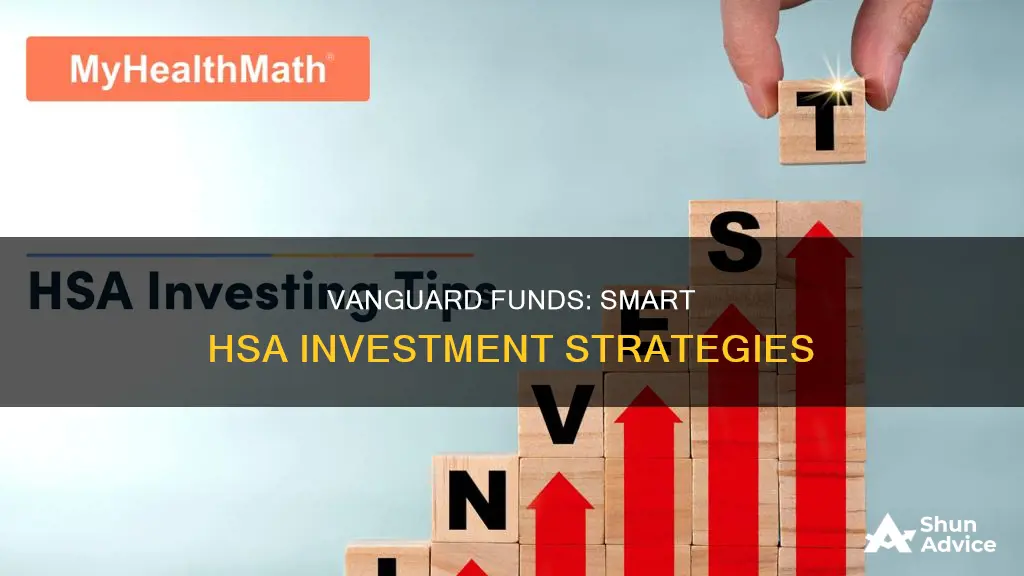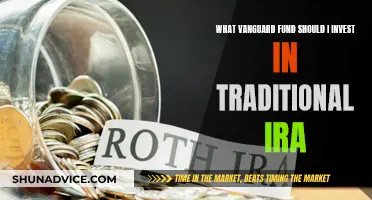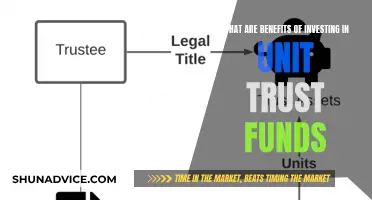
Health Savings Accounts (HSAs) are a great way to save for retirement and cover medical costs. If you're enrolled in a high-deductible health plan (HDHP), you can save money in an HSA to pay for medical costs now and in the future. HSAs are tax-advantaged, meaning contributions reduce taxable income, investment growth is tax-deferred, and qualified withdrawals are tax-free. One of the most popular HSA providers is Vanguard, which offers a range of funds with low costs and high quality. When choosing a Vanguard fund for your HSA, consider factors such as investment strategy, diversification, expense ratios, and historical performance. Here are some of the best Vanguard funds to consider for your HSA:
What You'll Learn

The triple tax advantage of HSAs
Health Savings Accounts (HSAs) are one of the most tax-advantaged accounts recognised by the IRS. They offer a triple tax advantage that other programs don't have. Here's how it works:
- Tax-free contributions: HSA contributions are not taxed. This is similar to a traditional 401(k) or IRA, where funds are taxed before they are put into the account. The IRS has set a limit on how much someone can contribute to an HSA each year to balance the tax advantages. For the 2024 tax year, the contribution limit is $4,150 for individuals and $8,300 for families, with an additional $1,000 allowed for those 55 or older.
- Tax-free growth: Accountholders can grow their HSA funds through interest or investing, and this growth is not subject to taxes. There is no expiration date or required minimum distribution for HSAs, allowing accountholders to grow their funds over time, all tax-free.
- Tax-free distributions: Funds spent from an HSA on qualified medical expenses are not taxed. This includes expenses such as doctor visits, dental and vision care. If HSA funds are used for non-qualified expenses, taxes and a 20% penalty will apply, unless the accountholder is 65 or older, in which case there is no penalty, but taxes are still due.
Mutual Fund Tax Strategies: Secrets to Tax-Free Investing
You may want to see also

How to choose the right fund for your goals
When choosing a Vanguard fund to invest your HSA in, it's important to consider your financial goals and risk tolerance. Here are some factors to keep in mind when making your decision:
Investment Strategy
Before choosing a fund, understand your investment strategy and how it aligns with your financial goals. If you're a buy-and-hold investor, look for funds with low portfolio turnover and broad market indexes. On the other hand, if you're an opportunistic trader, you might prefer funds with higher turnover and a more active strategy.
Diversification
Diversification is key to reducing risk and enhancing returns. Look for funds that invest in a broad range of assets, sectors, or markets. Vanguard offers funds that track the total U.S. stock market or specific market sectors, providing a diversified investment option.
Costs
Consider the expense ratio and minimum investment requirements of the fund. Lower expense ratios mean more of your investment returns stay with you. Additionally, some funds have minimum investment requirements, so ensure you can meet those thresholds.
Performance
While past performance doesn't guarantee future results, it can provide insight into the fund's management and strategy. Look for funds with strong long-term performance and positive trailing returns.
Tax Efficiency
Vanguard funds offer tax advantages, which can enhance your investment returns. Consider funds with tax benefits, such as tax-deferred growth or tax-free withdrawals for qualified expenses.
Risk Tolerance
Understand your risk tolerance and choose funds that align with your comfort level. If you're comfortable with higher volatility, you may consider funds with more aggressive investment strategies. If capital preservation is a priority, consider more conservative options like money market funds.
By considering these factors and aligning your investments with your financial goals, you can make a more informed decision when choosing a Vanguard fund for your HSA. Remember to review and adjust your investment strategy periodically as your goals and market conditions evolve.
Mutual Fund Investment Guide for NRIs in India
You may want to see also

The best Vanguard funds to buy and hold
When considering which Vanguard fund to invest in, it's important to remember that there is no one-size-fits-all answer. The best Vanguard fund for you will depend on your individual financial goals, risk tolerance, and investment horizon. That said, here are some of the best Vanguard funds to consider for a buy-and-hold strategy:
Vanguard S&P 500 ETF (VOO)
The VOO is one of the most popular Vanguard funds and for good reason. It tracks the S&P 500 index, giving you exposure to 500 of the largest US companies. The fund has an ultra-low expense ratio of 0.03% and is well-diversified across economic sectors. While its top holdings are from the tech sector (Microsoft, Apple, Nvidia, Amazon, and Alphabet), it is still a relatively low-risk investment option for those seeking capital appreciation.
Vanguard Total Stock Market Index Fund Admiral Shares (VTSAX)
The VTSAX is another highly diversified fund, tracking the CRSP US Total Market Index. It has over 3,700 stocks from all 11 market sectors and offers a low expense ratio of 0.04%. This fund has delivered an impressive annualized total return of 12.3% over the past decade, making it a solid choice for long-term investors.
Vanguard Mid-Cap Index Fund ETF Shares (VO)
For investors seeking a balance of risk and return, the VO is a great option. It tracks the CRSP US Mid Cap Index, offering exposure to medium-sized companies. While mid-caps have underperformed the broader markets in recent years, they have historically delivered excess returns relative to the S&P 500. The VO has an expense ratio of 0.04% and a 30-day SEC yield of 1.59%.
Vanguard Small-Cap Index Fund ETF Shares (VB)
The VB is perfect for investors eyeing small-cap companies with promising growth trajectories. It mirrors the performance of the CRSP US Small Cap Index and has an expense ratio of just 0.05%. The fund's top three holdings—Targa Resources, Axon Enterprise, and Builders FirstSource—are well-established companies with strong revenue and earnings growth.
Vanguard International High Dividend Yield Index Fund ETF Shares (VYMI)
For those seeking international diversification, the VYMI is a great choice. It provides exposure to foreign stocks with above-average dividend yields, such as Toyota Motor Corp., Nestle SA, and Shell. The fund has a reasonable expense ratio of 0.22% and a yield of nearly 5%.
Vanguard Health Savings Account (HSA)
While not technically an investment fund, a Vanguard HSA is worth considering as part of your financial and health wellness plans. It offers tax advantages, including tax-deductible contributions, tax-deferred investment growth, and tax-free qualified withdrawals. You can use it to cover qualified medical expenses now and in the future, and it can also be used for other purposes after age 65.
Index Funds: Long-Term Investment Strategies Explored
You may want to see also

The pros and cons of Vanguard funds
Vanguard is a well-known investment company with a solid reputation and a focus on low-cost investing. Here are some pros and cons of investing in Vanguard funds:
Pros:
- Low costs: Vanguard is known for its low fees and expense ratios, which are significantly lower than the industry average. This makes it ideal for long-term investors looking to minimize costs.
- Diverse fund selection: Vanguard offers a wide range of funds, including over 3,500 no-transaction-fee mutual funds and an expanded lineup of proprietary, low-cost, socially responsible mutual funds and ETFs.
- Tax advantages: Vanguard funds offer various tax benefits, such as tax-deductible contributions, tax-deferred investment growth, and tax-free withdrawals for qualified medical expenses.
- Robo-advisor service: Vanguard offers a robo-advisor service, Vanguard Digital Advisor, which provides automated investment advice and management for a low annual advisory fee.
- Strong reputation: Vanguard has a long track record dating back to 1975 and is highly regarded in the investment industry.
- Good for beginners: Vanguard's website offers educational resources and jargon-free content, making it a good option for beginner investors.
Cons:
- Basic trading platform: Vanguard's trading platform is basic and lacks the advanced tools and features that active traders typically require.
- High investment minimums: Many Vanguard funds have investment minimums of $1,000 or $3,000, which may be too high for some beginner investors.
- Limited research and data: Vanguard's website and mobile app offer limited stock research and detailed information, with data delays until order entry.
- Not ideal for active traders: Vanguard's platform is designed for long-term investors and does not cater to active traders or those seeking a robust trading platform.
- Lack of fractional shares: Vanguard does not offer fractional shares for most investments, except for Vanguard ETFs.
Overall, Vanguard is a good choice for long-term and retirement investors seeking low-cost investment options and a simple, passive investment strategy. However, it may not be suitable for active traders or those looking for more advanced trading tools and features.
Mutual Funds: Exploring Superior Investment Opportunities
You may want to see also

How to open a Vanguard HSA
To open a Vanguard HSA, you must be enrolled in a high-deductible health plan (HDHP) and not be enrolled in Medicare, claimed as a dependent on someone else's tax return, or have other health coverage (with a few exceptions).
If you meet these requirements, you can open a Vanguard HSA through your employer or a custodian that offers self-directed HSAs.
- Log in to your Vanguard account.
- Find the option to open a new HSA account. This may be under a specific section for health savings accounts or flexible spending accounts (FSAs).
- Follow the prompts to provide the necessary information and complete the account opening process.
It is important to note that contributions to an HSA can only be made if you are covered by an HSA-qualified health plan, so make sure to confirm that your health plan is eligible before opening the account.
Additionally, keep in mind that there are limits to how much you can contribute to your HSA each year, depending on your coverage and family situation. In 2024, the contribution limits are $4,150 for individual coverage and $8,300 for family coverage, with an additional $1,000 allowed for individuals aged 55 or older.
Semi-Short-Term House Fund: Where to Invest?
You may want to see also
Frequently asked questions
The Vanguard Total Stock Market Index Fund Admiral Shares (VTSAX) is a good fund for beginners as it is a passive fund that tracks the CRSP U.S. Total Market Index. It features a portfolio of more than 3,600 domestic equities, spanning all 11 market sectors, small-, mid- and large-cap stocks, and both value and growth styles. It has a low 2.2% turnover rate and a 0.04% expense ratio.
The Vanguard Wellington Fund Investor Shares (VWELX) is a good long-term investment fund. It was launched in 1929 and has returned an annualized 8.3% since its inception. Two-thirds of this fund are allocated to large- and mid-cap stocks with high dividends and low valuations, while one-third is allocated to investment-grade corporate bonds. The fund charges a 0.26% expense ratio and pays a 2.3% 30-day SEC yield.
The Fidelity Short-Term Bond Fund (FSHBX) is a good option for those looking for short-term investment. It holds high-quality, short-maturity bonds and has returned 1.4% annualized over the past 10 years. The fund charges a 0.3% expense ratio and has no required minimum investment.







